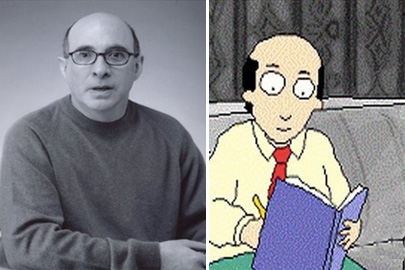Katz to help students discover their inner comic
Renowned comedian teaches "Short Form Comedy" this spring
 Courtesy of Comedy Central
Courtesy of Comedy CentralJonathan Katz and his alter ego, Dr. Katz.
Jonathan Katz, best known as the co-creator and star of the Comedy Central show “Dr. Katz: Professional Therapist,” has his reasons for teaching at Brandeis.
One is geography: He lives in Newton, Mass. Another, he says, “is the incredible history of the school and my real affection for Louis Brandeis.”
“He was a Supreme Court justice, right?” Then, a tick later: “I’ll never forget that.”
The quiet, deadpan humor is uniquely Katz; what he hopes to do in his course, “Short Form Comedy,” is have students explore what’s uniquely funny in each of them.
He’ll ask them to divide themselves into groups of three – in deference to the late-night television format of host, sidekick and guest. They'll try a variety of other comedic conceits as well, like a red-carpet scenario or a criminal deposition.
“That, all by itself, is a challenge,” Katz says, again deadpan, “because what if the class isn’t divisible by three? And there there’s shyness, which all by itself is pretty funny.”
Katz enjoyed a critically acclaimed cable run from 1995 to 1999 with his alter ego, Dr. Katz, but his myriad credits also include film work with Eddie Murphy, Janeane Garofalo and college pal David Mamet, and numerous appearances on late-night TV with David Letterman, Jay Leno, Conan O’Brian and Bill Maher. The author of the book “To Do Lists of the Dead,” he’s lately shifted his focus to the web, where he’s been working on podcasts and Internet-only programs like “Explosion Bus.”
“One thing about stand-up comedy and money? It might be the least expensive form of entertainment in the world. You need one person, one microphone and an audience,” he says, noting a recent resurgence of short-form comedy, which he attributes in part YouTube, but also to the depressed economy. “I did a show about two weeks ago for 600 strangers, but I would have told the same jokes at Walgreens.”
With his course, a version of which he has taught at Improv Boston in Cambridge, Mass., he wants students to help their classmates discover what’s uniquely funny about one another.
“And that’s probably why they’re there. Each of them suspects that something is uniquely funny about them,” Katz says of those who have enrolled. “I do believe there are people who are gut funny. The funniest people I know are not necessarily in comedy. Then there are comedians who are great writers of jokes.”
Katz makes it clear that he doesn’t want to humiliate his students – “I’ve done enough of that at night clubs and I was pretty gentle” – but wants to help them nurture their talents. He connects well with a younger crowd, which may be the result of entertaining his two 20-something daughters and their friends over the years, invited or not.
“But I have to remind myself that as a teacher, I don’t just make jokes,” he says.
Conscious of classroom decorum, Katz says he hopes to teach and inspire students using some of his own work and that of his favorite comedians. Dropping the names of friends and colleagues – some of the biggest in comedy – like Louis C.K., Larry David, Rita Rudner, Jerry Seinfeld and Dom Irrera, he says he will exclude some of their more vulgar work from his course.
“Whatever makes me uncomfortable” will be off-limits in class, he says – an acknowledgment of the setting. “I love comedians who are vulgar but also poetic... I have said many really reprehensible things in the name of comedy.”
The class will explore various types of humor and will heavily feature the use of technology to manipulate audio and video as a comedic device.
In fact, Katz, who describes himself as an audiophile, started his career as a musician, fronting a group called Katz and the Jammers.
“We were a seminal ‘80s band. Probably shaped the music of… nobody ever heard of us,” Katz says. “When I was singing, the audience sort of tuned out. When I would talk between songs, they’d tune in. So I came from music to comedy very gradually.”
Since he was diagnosed with multiple sclerosis in 1997, Katz says he’s taken an increased interest in physical comedy.
Overall, Katz says, he and his class will draw comedy from all realms of real life.
“You can’t really teach somebody to be funny, but you certainly can nurture whatever comic instinct they have,” he says. How? “Well, that’s where the Taser comes in.”
Categories: Arts





